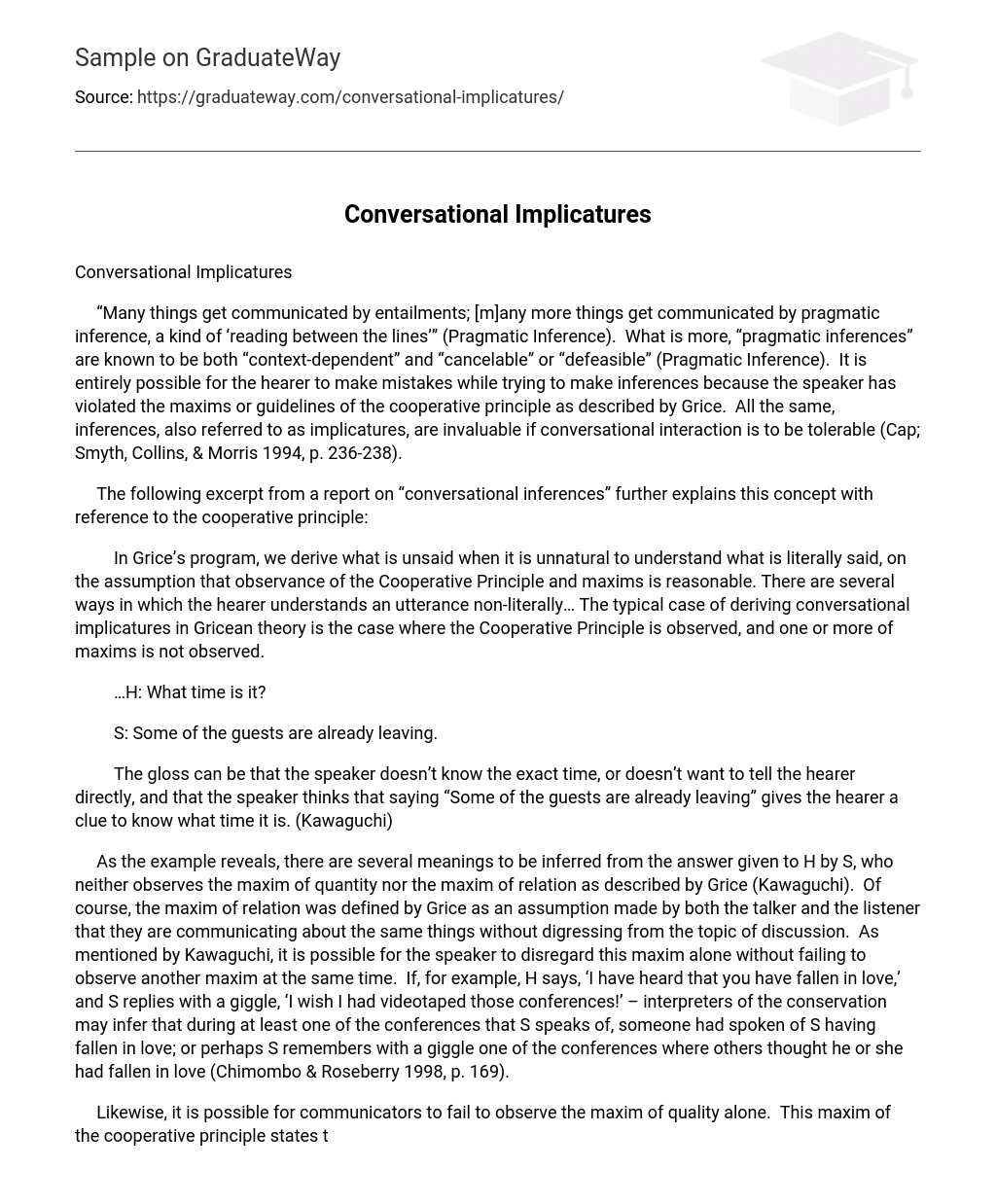“Many things get communicated by entailments; [m]any more things get communicated by pragmatic inference, a kind of ‘reading between the lines’” (Pragmatic Inference). What is more, “pragmatic inferences” are known to be both “context-dependent” and “cancelable” or “defeasible” (Pragmatic Inference). It is entirely possible for the hearer to make mistakes while trying to make inferences because the speaker has violated the maxims or guidelines of the cooperative principle as described by Grice. All the same, inferences, also referred to as implicatures, are invaluable if conversational interaction is to be tolerable (Cap; Smyth, Collins, & Morris 1994, p. 236-238).
The following excerpt from a report on “conversational inferences” further explains this concept with reference to the cooperative principle:
In Grice’s program, we derive what is unsaid when it is unnatural to understand what is literally said, on the assumption that observance of the Cooperative Principle and maxims is reasonable. There are several ways in which the hearer understands an utterance non-literally… The typical case of deriving conversational implicatures in Gricean theory is the case where the Cooperative Principle is observed, and one or more of maxims is not observed.
…H: What time is it?
S: Some of the guests are already leaving.
The gloss can be that the speaker doesn’t know the exact time, or doesn’t want to tell the hearer directly, and that the speaker thinks that saying “Some of the guests are already leaving” gives the hearer a clue to know what time it is. (Kawaguchi)
As the example reveals, there are several meanings to be inferred from the answer given to H by S, who neither observes the maxim of quantity nor the maxim of relation as described by Grice (Kawaguchi). Of course, the maxim of relation was defined by Grice as an assumption made by both the talker and the listener that they are communicating about the same things without digressing from the topic of discussion. As mentioned by Kawaguchi, it is possible for the speaker to disregard this maxim alone without failing to observe another maxim at the same time. If, for example, H says, ‘I have heard that you have fallen in love,’ and S replies with a giggle, ‘I wish I had videotaped those conferences!’ – interpreters of the conservation may infer that during at least one of the conferences that S speaks of, someone had spoken of S having fallen in love; or perhaps S remembers with a giggle one of the conferences where others thought he or she had fallen in love (Chimombo & Roseberry 1998, p. 169).
Likewise, it is possible for communicators to fail to observe the maxim of quality alone. This maxim of the cooperative principle states that conversational interaction is based in truth that may be substantiated by evidence. However, compulsive liars, schizophrenics as well as writers and poets of metaphor are not expected to observe this maxim in all of their conversations. There are literary metaphors, for example, ‘My heart is hidden in a nest of posies.’ Such metaphors are not meant to confound those that interpret them. Rather, it is easy to interpret their meanings (Chimombo & Roseberry, p. 170).
The maxim of quantity in the theory of cooperative principle as propounded by Grice is based on the assumption that participants in a conversation use an adequate amount of words to render their conversational interaction meaningful. In other words, they neither speak too much nor too little to be understandable to one another. As with other maxims of the cooperative principle, there are various ways of flouting this guideline of meaningful communication. If, for example, a woman tells a man at work, ‘You are extraordinarily good at your work,’ and smiles in a flirtatious manner, but the man walks away without answering her, his refusal to deliver a reply requires an inference. In fact, his refusal is an answer in its own rights. There are other ways to flout this convention, too. For instance, H might ask S whether he or she knows where the nearest police station is, and S may reply with a curt ‘Yes’ before walking away, implying that he or she does not wish to inform H about the location (Chimombo & Roseberry, p. 171).
The fourth maxim in Grice’s theory, the maxim of manner, may be similarly flouted. This guideline of the cooperative principle has participants in a conversation assume that everything that is said is succinct and “orderly without being obscure or ambiguous” (Chimombo & Roseberry, p. 171). If, however, a professional scientist starts to utter technical jargon while communicating with somebody who does not understand those technical terms, the listener is left to interpret the meanings of those terms in light of everything else that is spoken by the scientist.
Thus, all four maxims of the cooperative principle may be flouted by participants in a conversation. It is not possible to imagine communication without inferences or conversational implicatures just as poets of metaphor do not cease to exist. Even so, it must be borne in mind that inferences may be incorrect and there are various meanings that a thoughtful individual may infer from given words.
REFERENCES
Cap, P, ‘Cooperative Principle Revisited: Evidence from CL Approach,’ viewed 9 Jan 2009,
<http://www.geocities.com/strus_pl/CPRevisited.pdf>.
Chimombo, M, & Roseberry, RL 1998, The Power of Discourse: An Introduction to Discourse
Analysis, Lawrence Erlbaum Associates, Philadelphia, PA, USA.
Kawaguchi, Y, ‘Conversational Inferences: the Hard Way and the Easy Way,’ viewed 9 Jan
2009,
<http://www.speech.cs.cmu.edu/sigdial2003/proceedings/24_LONG_kawaguchi_Conversational_Inferences_revised.pdf>.
Pragmatic Inference: ‘Pragmatic Inference,’ viewed 9 Jan 2009,
<http://www.stanford.edu/class/linguist1/Slides/prag2-slides.pdf>.
Smyth, MM, Collins, AF, & Morris, PE 1994, Cognition in Action, Psychology Press, East
Sussex, UK.





